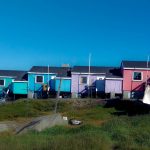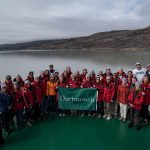- We may have been in icy waters, but the warmth of the Dartmouth fellowship was felt by all.
- Ross and I discussing one of his lectures on board.
- Up close and personal with humpback whales.
- On land, brightly painted houses presented eye-popping color against a clear blue sky.
- Gail and I on the ice sheet.
- Our Dartmouth cohort put the “(Big) Green” in Greenland.
What an adventure! We just got back from our Arctic trip to Baffin Island and Greenland, where we had the pleasure of joining a group of alumni and Dartmouth Professor Ross Virginia on a truly memorable voyage.
Seeing the beauty of the Arctic first-hand was a remarkable experience, but not nearly as remarkable or inspiring as witnessing Ross’s outstanding research on the arctic ecosystem near Kangerlussuaq, Greenland, where he and his students are seeking to explain the impacts of climate warming on soils and greenhouse gas emissions and the causes of the widespread erosion and loss of vegetation that are evident on the landscape. We also learned of Professor Bob Hawley’s work with students in Illulissat on fluid dynamics and glacial flow, studying how groundwater lubricates and impacts the flow of glaciers into the sea and, in turn, the mass balance of the Greenland Ice Sheet and future sea level rise.
Without a doubt, this trip highlighted something I’ve learned in hundreds of meetings with faculty I’ve had during my time as president, and that is just how impressive our Dartmouth faculty are. At every turn, they amaze me with path-breaking basic research and with applied research that touches every corner of this globe. Equally impressive are the ways in which they integrate students – from the earliest undergraduates through graduate and professional students – as they push the frontiers of knowledge.
There were approximately 50 passengers aboard the boat, including 30 or so from Dartmouth, the youngest a current student and the oldest a member of the Great Class of ’57. (Incidentally, it was the latter who owned the arctic plunge pool on deck…think “Polar Bear Swim” in Occom Pond, only three times as cold!) It’s safe to say that our Dartmouth contingent set the standard for the adventuresome spirit on board, unafraid to jump into our kayaks and brave the icy waters to get a closer look at the icebergs, and boy did it pay off. On our first day out, we befriended two humpback whales who seemingly took keen interest in us, circling our kayaks and treating us to an incredible display of their power and beauty from only about 15 yards away! It’s a moment I’ll never forget, mesmerizing to say the least.
While en route, I was happy to provide our Dartmouth cohort an update on the goings-on at the College, and while on board, we had the privilege of taking in three lectures by Ross. One was focused on climate change; another presented a historical look at famed Arctic explorer Vilhjalmur Stefansson, who spent the latter part of his career at Dartmouth and whose extensive collection of papers, housed in Rauner, are among the most globally significant academic resources pertaining to Arctic exploration in existence; and the third centered on the ecology of the arctic, the specific focus of Ross’s most recent research. We also heard from several naturalists traveling with us, including a polar bear expert, all of whom were engaging, insightful and passionate about the Arctic region and eager to share their perspectives on the far-reaching effects of climate change.
With the Arctic warming twice as fast as the rest of the world, there is still so much to learn and so much at stake. Yet the biggest take-away for me was the urgency and delicacy with which the we must approach issues of energy, environment, global governance, security and healthcare in a region so crucial to the world and in the midst of such rapid climate change, and the role Dartmouth can play in helping to pave the responsible way forward for its people and the planet. It is a grand aspiration, though one that I believe is well worth the commitment.







